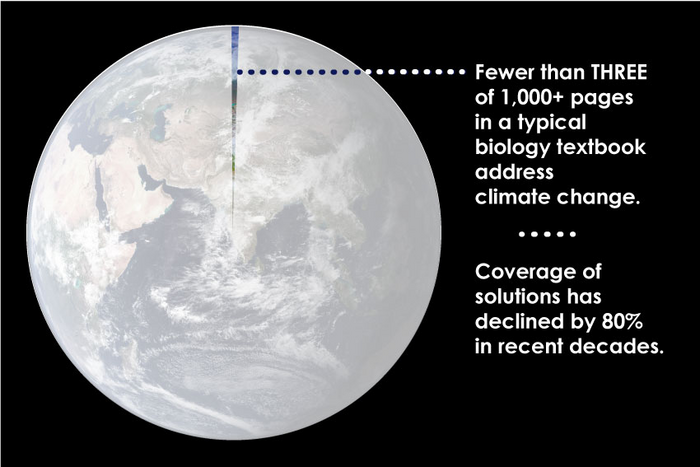Coverage of climate change in college biology textbooks expanded greatly during the 1990s, but recent changes have been minor and emphasize the impacts of climate change rather than focusing on solutions. Rabiya Arif Ansari and Jennifer Landin of North Carolina State University report these findings in a new study published December 21 in the open-access journal PLOS ONE.

Credit: J.M. Landin, CC-BY 4.0 (https://creativecommons.org/licenses/by/4.0/)
Coverage of climate change in college biology textbooks expanded greatly during the 1990s, but recent changes have been minor and emphasize the impacts of climate change rather than focusing on solutions. Rabiya Arif Ansari and Jennifer Landin of North Carolina State University report these findings in a new study published December 21 in the open-access journal PLOS ONE.
Climate change remains a massive threat to human society, and to the ecosystems on our planet. But according to a 2021 Gallup poll, only 43% of Americans see climate change as a serious threat during their lifetimes. Science textbooks can serve as historical documents showing how climate change has been taught in the classroom, and so Ansari and Landin analyzed 57 college biology textbooks to see how climate change coverage has changed from 1970 to 2019.
Their analysis showed that coverage of climate change has continually expanded, with the greatest increase occurring in the 1990s. Over time, however, the passages devoted to climate change have moved further back in the books, moving from the last 15% to the last 2.5% of pages. Coverage also shifted from a description of the greenhouse effect to focusing on the effects of climate change, especially on the movement of ecosystems in response to the changing climate. The study also showed that the proportion of the text dedicated to actionable solutions to climate change peaked in the 1990s at over 15% of the passage, but then decreased in recent decades to just 3%. When the researchers examined the images, they saw that the textbooks presented only graphs of global temperatures and carbon dioxide levels prior to the year 2000, but did include more variety in recent figures, including glacier melt and shifts in distributions in the last two decades.
The researchers conclude that the amount of coverage, the placement within the book and the proportion of the text devoted to solutions indicate that climate change coverage in biology textbooks has not kept pace with the severity or scope of the problem. They urge authors, publishers and educators to address the topic earlier in biology courses and propose that educators intentionally pair coverage of climate change effects with potential solutions. Ultimately, they hope these changes would allow students to better engage with the topic of climate change, as they accept and adapt to global warming.
The authors add: “We were shocked that textbook passages addressing climate change remained so short, even in recent decades, and that the coverage of solutions actually decreased. The information in these textbooks educated generations; the minimal content about climate change reflects how little the topic has been valued.”
#####
In your coverage please use this URL to provide access to the freely available article in PLOS ONE: https://journals.plos.org/plosone/article?id=10.1371/journal.pone.0278532
Citation: Ansari RA, Landin JM (2022) Coverage of climate change in introductory biology textbooks, 1970–2019. PLoS ONE 17(12): e0278532. https://doi.org/10.1371/journal.pone.0278532
Author Countries: USA
Funding: The authors received no specific funding for this work.
Journal
PLoS ONE
DOI
10.1371/journal.pone.0278532
Method of Research
Observational study
Subject of Research
Not applicable
Article Title
Coverage of climate change in introductory biology textbooks, 1970–2019
Article Publication Date
21-Dec-2022
COI Statement
The authors have declared that no competing interests exist.




